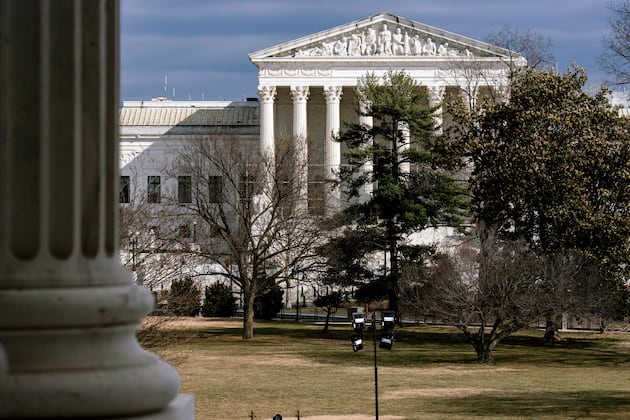Copyright Salt Lake City Deseret News

The Supreme Court on Monday heard oral arguments in a religious liberty case, Landor v. Louisiana, that centers on if an individual can sue for damages if they are in prison at the time of their rights being violated. Damon Landor was serving a five-month prison sentence, and with just weeks left to go in his term, his dreadlocks were forcibly cut. Per reports, Landor is a devout Rastafarian and grew the dreadlocks for nearly 20 years in accordance with his faith. However, the justices sounded skeptical of Landor’s case, with Monday’s oral arguments lasting about two hours. A majority of the justices appeared to agree that the text of the law does not allow Landor to sue for money damages. The case touches on two federal laws, both designed to protect religious liberties. The Religious Freedom Restoration Act and the Religious Land Use and Institutionalized Persons Act. Landor’s attorneys argued that lower courts were wrong in dismissing his case and saying he had no grounds to sue the prison officials who shaved his head, the Deseret News previously explained. Lawyers face skepticism During Monday’s oral arguments before the high court, Zachary Tripp, the attorney representing Landor, faced tough questions from the justices, particularly over RLUIPA’s spending clause. He noted that nearly everyone involved in the case, including the state of Louisiana, acknowledged that Landor was treated unfairly. RLUIPA’s spending clause means Congress can put conditions on federal funds going to states. Congress mandates that states will follow the law and not violate inmates’ religious rights as a condition for accepting federal funding. Lower courts decided the state officials, or individual prison guards in Landor’s case, are not the direct recipients of the federal money and cannot be required to provide monetary damages. “That’s the heart of this program, under RLUIPA is, if you want federal funds for state prison, you need to accommodate religious liberty,” he said in response to questioning from Justices Clarence Thomas and Sonia Sotomayor about the spending clause and previous cases before the court. Chief Justice John Roberts, during his questioning, examined the contract or deal between the federal government and state prisons. He asked a question similar to a point raised by the lower courts, which is that the agreement was made between federal and state governments, not the federal government and state employees. “These are not members of the general public, they’re state officers, they voluntarily accepted this job. They each have all of their own employment contracts and they take (the job) subject to that condition,” Tripp replied. Justice Brett Kavanaugh questioned whether prison guards had a clear notice that they could be held liable and subject to be sued for monetary damages under RLUIPA. Other justices, including Neil Gorsuch and Amy Coney Barrett, also focused on the notice. Gorsuch highlighted the courts that have been against Landor’s position for “many, many, many years.” Tripp argued that when individuals accept a position from a state prison, they are consenting to agree with the contract between the state and federal government, thus meaning they can be sued in their individual capacity. Without damages, an inmates’ rights being violated are “meaningless,” he said. But the justices pushed back, questioning if RLUIPA’s phrasing was not as “clear as it could be.” Libby Baird, the assistant to the U.S. solicitor general, argued Landor’s case on behalf of the Trump administration. The administration and many other religious and nonreligious organizations filed friend-of-the-court briefs on behalf of Landor before the court. Baird, like Tripp, faced questioning about clear notice from the justices. She argued that it “isn’t surprising” to state officials that they must follow the United States Code. Guards don’t need to have an explicit notice that they could be sued in an individual capacity should they violate an inmate’s rights because it’s known that they’re working in partnership with the state and federal governments under RLUIPA, Baird argued. “Officers are used to facing 1983 liability and are liable for violation of all constitutional provisions,” she said. “They know that certain requirements apply to them when they accept employment in a federally funded prison.” Baird appeared to earn the support of Justices Ketanji Brown Jackson and Elena Kagan for that idea under Section 1983, which allows individuals to sue government officials when their constitutional rights have been violated. Louisiana’s argument Benjamin Aguiñaga, the solicitor general of Louisiana, spoke last on Monday. He argued that RLUIPA does not “clearly and unambiguously” create the option for someone in their individual capacity to be sued for damages. He noted that there are “valid concerns” that Congress has not explicitly outlined damages, but argued that Congress needs to pass new legislation to amend RLUIPA in order to make it clear. “The answer is across the street, not here,” he said, pointing to Capitol Hill nearby. In regard to Tripp and Baird’s arguments about state employees, Aguiñaga said he believes that “every employee in the country would be shocked to learn that just by accepting employment with their employer, they have thereby personally bound themselves.” Aguiñaga faced some tougher questions from the court’s more liberal justices, Jackson, Kagan and Sotomayor, including over some of the court’s previous cases like the 2023 decision Health and Hospital Corporation of Marion County v. Talevski, and the 2020 ruling in Tanzin v. Tanvir. Tanzin was a case brought before the court by Muslim men placed on the FBI’s No Fly List. Under the other federal law examined in Landor’s case, RFRA, the men were able to receive monetary damages. Landor and Tripp are arguing that RFRA, known as the sister statute to RLUIPA, and the Tanzin decision should pave the way for Landor to receive individual capacity damages. Aguiñaga argued there are many cases from 2000 to 2020 where no state officials were on notice about being liable as individuals. In his rebuttal, Tripp pushed back on Aguiñaga’s argument that individual capacity damages are not warranted and highlighted what experts say is at stake in this case. If Landor, and others, are unable to sue prison guards in their individual capacities for money, there is no other remedy they can get. If there is not remedy for someone’s religious rights being violated in prisons, what is to stop it from happening again, the advocates for Landor’s case asked. “Think about what Congress that enacted this law was trying to do,” Tripp said of RLUIPA. “And I think it’s clear as day on the statute.” A decision in the case is expected by late June or early July of 2026.



